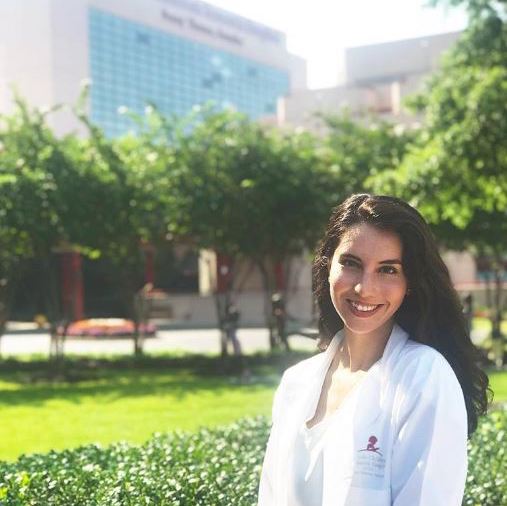A passion for pediatric wellness
Soumia Bekka ‘19 gained valuable career experience through a summer internship at St. Jude
By Megan Bradshaw on December 6, 2018

Senior biology major Soumia Bekka has been interested in understanding pediatric disease since she was a teenager volunteering at a pediatric nursing facility. At Towson University she joined the TU Herpes Virus Laboratory researching combination drug therapy for the herpes simplex virus. Nearly three years later, she began her own project researching human cytomegalovirus.
Last summer the Honors College student participated in an internship in the Department of Infectious Diseases at St. Jude Children’s Research Hospital in Memphis, Tennessee.
Where was your internship at St. Jude?
I participated in the St. Jude Children’s Research Hospital Pediatric Oncology Education (POE) Program. I worked in Dr. Ellie Margolis’ lab, which focused on how the gut microbiome influences pediatric diseases.
How would you describe a typical day?
After reading scientific articles and drafting my exit paper, I worked in the lab. I usually spent around two to three hours running experiments before I had lunch lecture.
Hospital staff lectured on their work and research, and often shared their life stories. It was inspiring to hear all of the paths doctors and researchers followed to do amazing work at a world-renowned hospital. After the lunch lecture, I headed back to the lab before taking the bus back to my apartment. Then my fellow POE students and I were free to explore Memphis and eat tons of barbecue.
What did you learn as a result of your work in the lab?
At the end of the summer, I presented my research for my fellow POE students and some of the staff at St. Jude. My project, “Impact of the Infant Gut Microbiome on Rotavirus Vaccine Shedding,” studied the disparity in rotavirus vaccine efficacy between high-income and low-income countries.
I focused on the impact the infant microbiome may have on the rotavirus vaccine. I hypothesized the differing compositions in the gut microbiomes in infants from high-income and low-income countries resulted in the differences in rotavirus vaccine efficacy. In order to test my hypothesis, I spent most of the summer developing a method to quantify the amount of shedding in the stool to measure the efficacy of a vaccine.
At the end of the summer, I began preliminary testing on stool samples obtained from healthy infants after the administration of the RotaTeq vaccine from Seattle Children's Hospital. My assay was successful in measuring shedding in one of the participants, but it still needs further optimization and testing. The goal is to have a large study to correlate the differences in the gut microbiome with the length of rotavirus vaccine shedding.
Why did you present your research at the fall 2018 Celebration of Scholarship and Learning?
I really wanted to share the experience I had at St. Jude, and I’m proud of what I accomplished last summer. I also really love talking about research and hearing feedback from others on my work. I learn a lot from presenting my research. It is also a challenge. I can gauge how much I actually know from how comfortable I am when I talk about my research and my ability to answer questions.
What are your plans? How did this experience help you?
I will be applying to medical school in June to pursue my M.D./Ph.D. I am interested in pediatrics and infectious disease research, so this opportunity provided a perfect experience in both fields. In addition, my mentor, Dr. Margolis, is an M.D./Ph.D., so working with her every day offered a glimpse into what my life might be like.